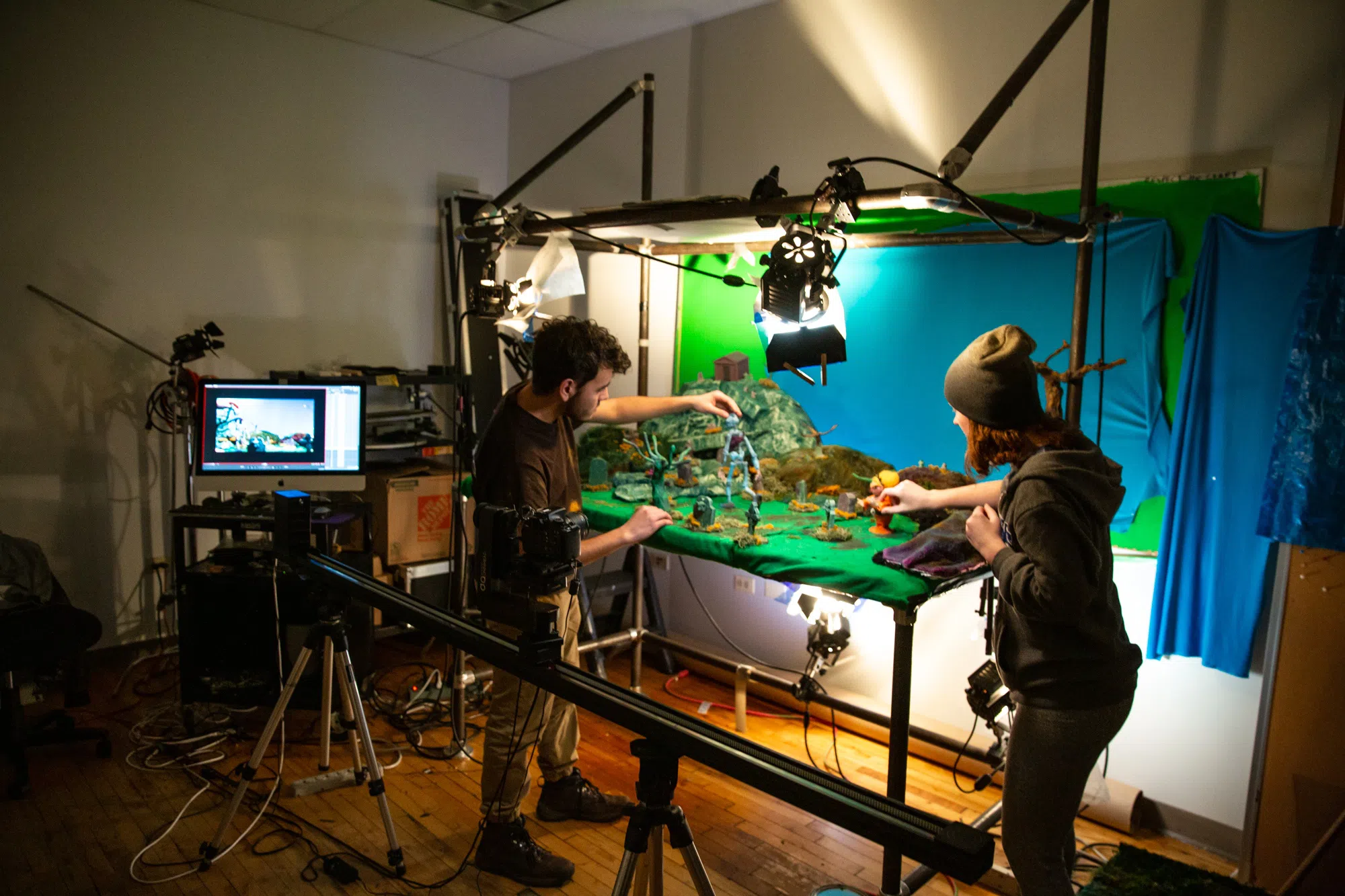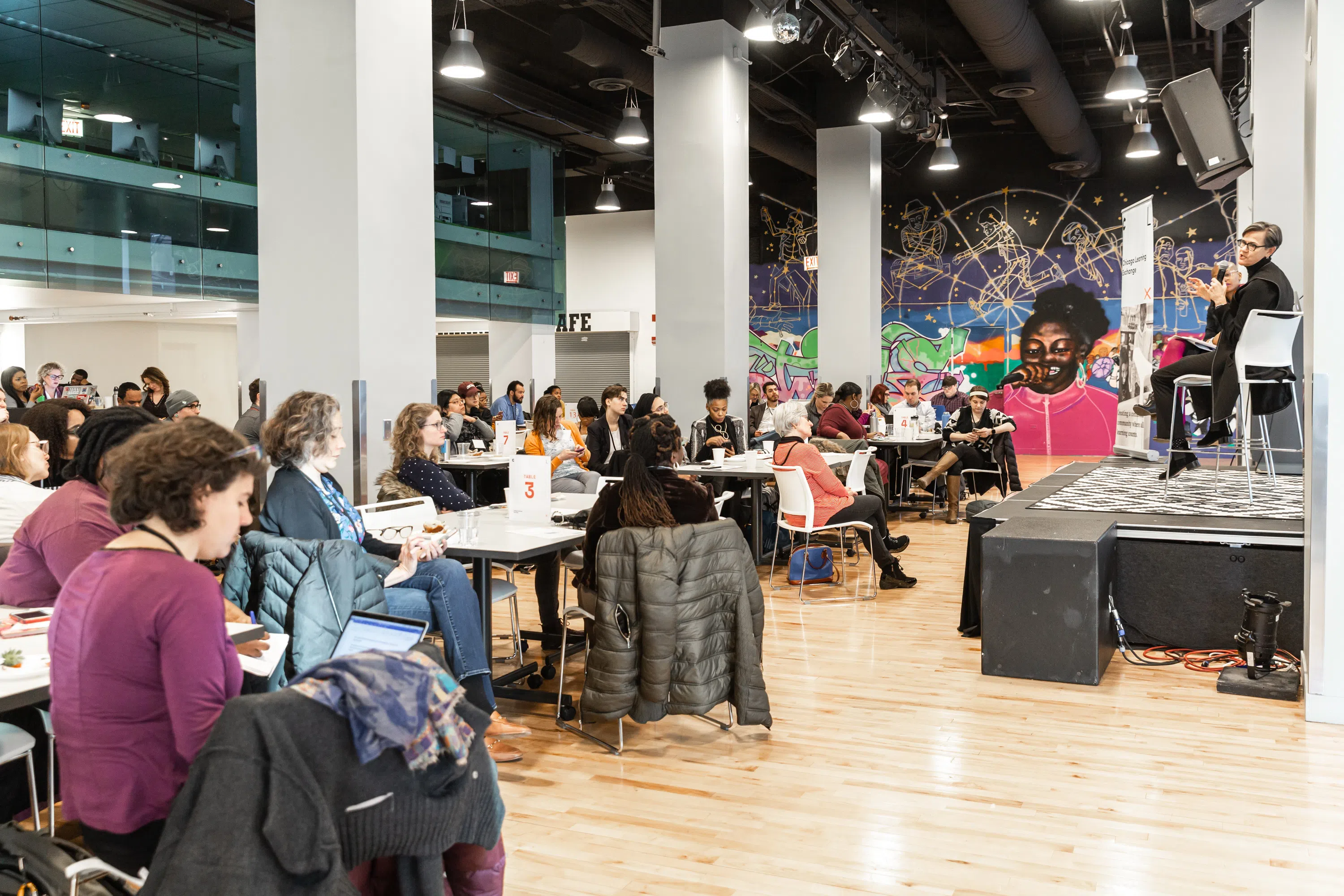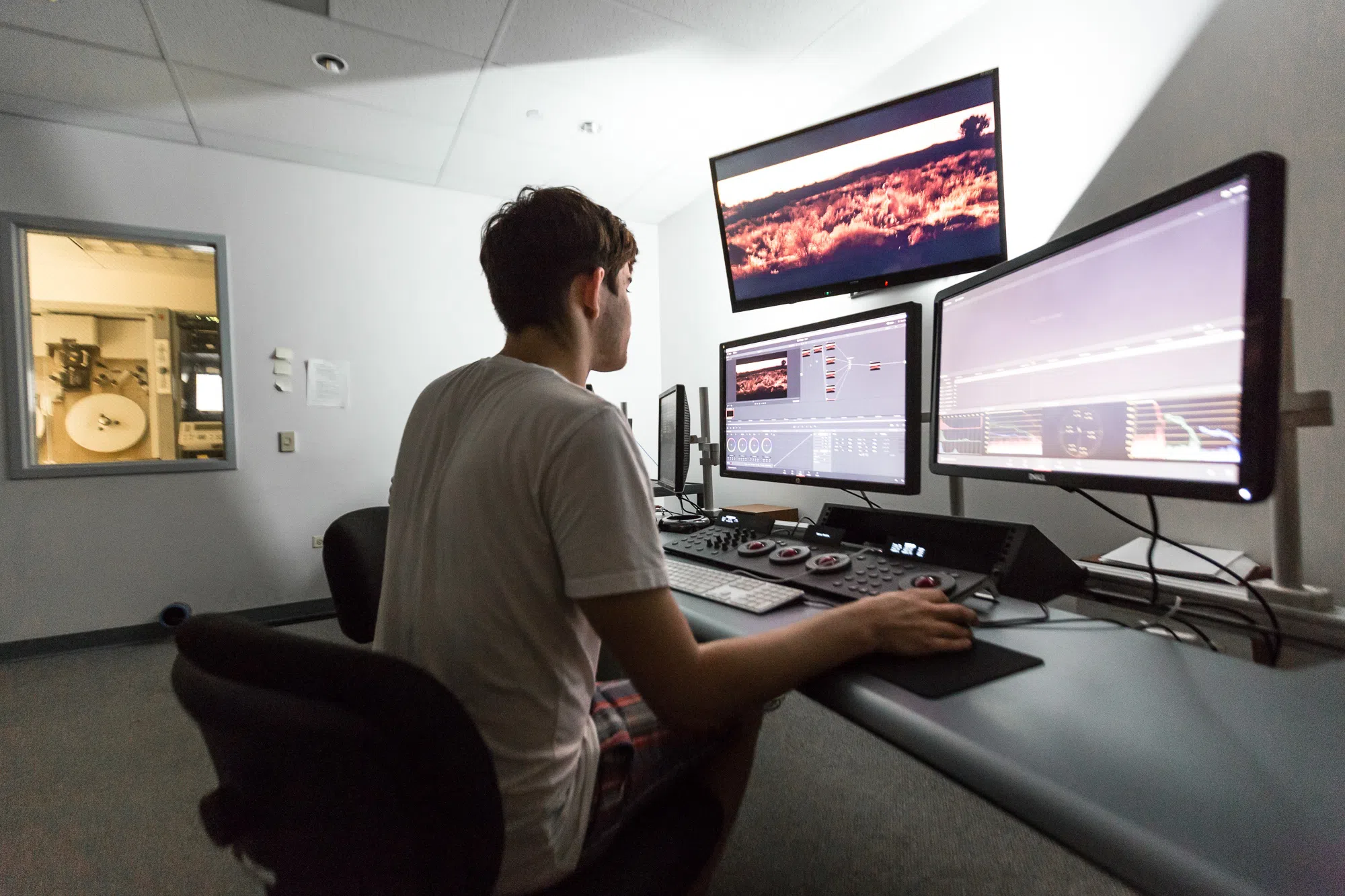1104 S. Wabash
1104 S. Wabash houses many spaces dedicated to our Cinema and Television Arts Program, such as the Film Row Cinema Theatre, Frequency TV and Post Production Center. The Conaway Center, Frannie’s Café, and the Glass Curtain Gallery are also on the first floor.
Media Gallery
Facilities
Cinema and Television Arts
Interactive Arts and Media
⭐ Facilities
Learn more about the facilities in this building.
Conaway Center
The Conaway Center is an open layout, multi-purpose events space and student hangout area. The space has an open floor plan, making it customizable for many types of events. Appropriate events include concerts, dance, theater, panel discussions, job fairs, conferences, and fashion shows.
Film Row Cinema
Film Row Cinema is our 260-seat, state-of-the-art theatre for film screenings, lectures, discussions, and debates.
Post-Production Audio Suite
Add, edit, or mix sound for your projects in the Post-Production Audio Suite. Facilities include a 15-station Pro Tools computer lab, a Foley stage, four 5.1 surround sound Individual Editing rooms, and two large Audio Mixing Stages.
Post-Production Center
Complete all your post-production needs with our industry-standard systems and spaces for editing, effects, color correction, finishing, and mastering.
The Resource
The Resource is a pre-production and development space for students to locate crews, cast, and other production resources for their registered advanced productions. The space includes a script library, a computer lab with industry-standard software for screenwriting, budgeting, and scheduling, as well as flexible meeting spaces to accommodate students in all phases of film projects.
Screening Rooms
The Cinema and Television Arts Department has 6 small and medium-sized screening rooms, plus the 260-seat Film Row Cinema, located in the 1104 S. Wabash building for class film screenings and events.
Advanced Camera Center
The Advanced Camera Center provides digital and film camera equipment to students in advanced cinematography classes and to advanced cinema productions.
Intermediate Equipment Center
The Intermediate Equipment Center offers camera, lighting, and sound equipment to students enrolled in foundation and intermediate-level cinema and documentary classes.
Stop-Motion Labs
Dedicated lab areas with four work stations for students to build, film, and edit stop-motion animation projects. Each stage in the stop-motion labs are equipped with Dragonframe capture software and digital cameras. The Advanced Stop-Motion Lab includes space for more advanced sets and a motion-control camera rig.
Traditional Animation Camera Labs
Camera stations equipped with state-of-the-art Dragonframe stop-motion software for traditional pencil testing and other direct forms of animated filmmaking.
Photography Lighting Studio
Open to students enrolled in a Photography course, the 6,800-square-foot lighting studio is fully equipped with industry-standard cameras, lighting equipment, and computers. Create custom backdrops and scenes, experiment with lighting, and bring your vision to life with the help of knowledgeable and experienced staff.
Letterpress Studio
Learn to handset type and translate digital files into photopolymer plates for relief printing on the letterpress machines. We house an extensive collection of wood and metal type, ornaments, borders, and cuts. The studio is open to students enrolled in a letterpress course, as well as graduate students and artists-in-residence. You’ll have the opportunity to interact with artists from across the college as well as nationally and internationally acclaimed artists.
Papermaking Studio
Open to students enrolled in or who have successfully completed a course in papermaking, our studio provides everything you’ll need to create your own paper from a variety of materials including cotton, abaca, flax, kozo, and even recycled clothing. Learn various sheet-forming techniques using both Eastern and Western practices. You’ll be encouraged to experiment with sculptural paper, pulp painting techniques, and non-standard fibers.
Bookbinding Studio
Our dedicated space for bookbinding is a sunlit studio where you can create professional volumes by hand. Using traditional and contemporary bookbinding methods, you can create artist books (and boxes in which the book can be held) to create a story or become a sculptural object. The studio contains a robust set of equipment and materials, including a wide variety of book presses and binding tools that can handle various papers, book cloth, and materials.
⭐ Cinema and Television Arts
In Cinema and Television Arts, you'll learn to express your creative ideas on screens both large and small, and develop in-demand media production skills for careers in film, television, and emerging media.
Film and Television (BA | BFA)
As a Film and Television student, you’ll develop team-building, communication, and creative-planning skills that will enable you to lead teams in any creative setting. You’ll think analytically about the filmmaking process from concept development to screen, and learn to write, produce, direct, and edit effectively. Being well rounded will help you secure jobs in the independent and Hollywood film industry.
Interdisciplinary Documentary (BA)
The Interdisciplinary Documentary bachelor’s degree at Columbia College Chicago explores the diverse and innovative ways we collectively craft truth in story, image, text, and sound. As an Interdisciplinary Documentary major, you’ll have the chance to create compelling nonfiction narratives in video, audio, journalism, and photography. You’ll also work in new formats like AR/VR, 360 video, and interactive documentary. After graduation, you’ll have a portfolio that spans disciplines and media formats. Your portfolio may land you jobs with documentary production and postproduction companies or may launch your career as an independent documentary filmmaker.
Television Writing and Business (BFA)
The BFA in Television Writing and Business addresses the growing need to prepare students for launching and managing entertainment projects while maintaining creative control of their productions. Today's studios, networks, and independent production companies seek creatives with high-level writing skills, sound business acumen, and entrepreneurial thinking. This program fulfills that need while also teaching students how to create their own opportunities for employment and engagement with the television and digital media industry.
⭐ Interactive Arts and Media
In the Interactive Arts and Media Department, you’ll work with new and emerging technologies to create the immersive experiences of the future. We’re at the forefront of creative tech—from video games and animation to virtual reality (VR) and app development.
Computer Animation (BFA)
Explore the world of 3D computer animation in Columbia College Chicago’s Computer Animation program. Learn technical and storytelling skills from a faculty of professional animators with decades of industry experience. The best artists constantly create. At Columbia, you’ll start animating in your first year. With practice you’ll become more comfortable with the tools of the trade and develop a keen eye for storytelling. As a senior, you’ll collaborate with peers to create an animated film. There’s a reason we’re consistently ranked among the top animation schools in the Midwest and beyond. Columbia animation students bring a unique voice and aesthetic to their work, and best of all, employers want our grads. You’ll find Columbia alums around the world working in major animation studios and showcasing their award-winning films at festivals.
Game Art (BA)
Game artists imagine the visuals that bring video games to life. From the game's environment—the hillsides, the dark caverns, the rooms—to the characters themselves, game art visually connects the gamer to the game. As a student in the Game Art BA program at Columbia College Chicago, you’ll create visually striking and compelling 3D art and learn how to implement those art pieces into a game engine. As a Game Art major, you’ll build games right away in your first semester and create many more throughout your time at Columbia. The software tools you’ll use in class are the same ones you’ll use as a professional game artist. And our curriculum mirrors the collaborative environment of the game industry. The Game Art program will give you the technical skills you'll need to compete for a job in the industry, and with experience working on a team, you’ll be a valuable candidate for employers.
Game Design (BA)
In the Game Design major at Columbia College Chicago, you’ll design games and simulations in terms of gameplay, narrative, and user experience. Mastering a creative skill takes a tremendous amount of practice. That’s why you’ll make games in nearly every gaming class at Columbia and build your skill set over time. And you’ll learn from some of the best—our talented faculty members are experienced professionals who bring their passion for games into the classroom. In your final year, you’ll develop an entire finished game product with other game-related majors in a capstone experience we’ve designed to mirror the professional game industry production model. Students in the Game Design major choose one of two concentrations: Game Development or Sound Design.
User Experience and Interaction Design (BA)
The bachelor's degree in User Experience and Interaction Design at Columbia College Chicago trains you to be a technologically competent designer and a design-minded developer. You'll learn a creative, art-driven approach to finding the best design solutions for users of electronic interfaces from websites to voice-activated programs.
You'll learn how to design with users in mind and how to be an independent professional who relies not on narrow technical skills but on best practices and theories of human-computer interaction. But we don't ignore the hard skills. With required courses in programming and physical computing, combined with extensive coursework in user research and design, the program enables you to enter the workforce ready for careers in programming, user experience, interface or industrial design, product development, and web development.
User Experience and Interaction Design teaches you how to find solutions. You'll be tested and challenged in this bachelor's degree program, and through your successes and mistakes you'll learn and grow as an artist, a student, and a professional.
You'll learn how to design with users in mind and how to be an independent professional who relies not on narrow technical skills but on best practices and theories of human-computer interaction. But we don't ignore the hard skills. With required courses in programming and physical computing, combined with extensive coursework in user research and design, the program enables you to enter the workforce ready for careers in programming, user experience, interface or industrial design, product development, and web development.
User Experience and Interaction Design teaches you how to find solutions. You'll be tested and challenged in this bachelor's degree program, and through your successes and mistakes you'll learn and grow as an artist, a student, and a professional.
Programming (BA | BS)
Create the code that drives games, simulations, and other interactive experiences. At Columbia College Chicago, we teach programming as an artistic practice that combines theory and practical application to bring ideas to life. Programming is an art form that takes practice. That’s why you’ll start making games and applications your first year and build your confidence and skills throughout your time at Columbia. You’ll work in team environments to develop your collaboration skills and create a portfolio of games and applications that can help you land a job as a programmer in a variety of fields. We offer a Bachelor of Arts (BA) degree and a Bachelor of Science (BS) degree in Programming. You’ll take a number of scripting, programming, physical computing, and game development courses in both degrees, but BS students take additional mathematics courses. Within the BA or BS degree, choose from two concentrations: Application Programming and Game Programming.
Traditional Animation (BFA)
Explore the worlds of stop-motion and hand-drawn animation in Columbia College Chicago’s Traditional Animation BFA program. Learn technical and storytelling skills from a faculty of professional animators with tons of industry experience—because the best artists constantly create. At Columbia, you’ll start animating in your first year and choose a concentration in either hand-drawn or stop-motion animation. As a senior, you’ll collaborate with peers to create a 6-minute animated film. There’s a reason we’re consistently ranked among the top animation schools in the Midwest and beyond. Columbia animation students bring a unique voice and aesthetic to their work, and best of all, employers want our grads. You’ll find Columbia alums around the world working in major animation studios and showing films.
Immersive Media (BA)
Students in the BA Immersive Media program develop the creative and technical skills central to producing augmented, mixed, and virtual reality experiences. Students are equipped to work as cross-platform developers in any number of media industries where immersion is transforming the way we experience and interact with the world. The degree program is for the next generation of film, television and media artists, game designers, user experience designers, creatives skilled in computation, and those in liberal and performing arts disciplines interested in pioneering emerging media.
At its core, students in the program develop skills in programming, interaction design, user experience, spatial computing, data visualization and other foundations of immersive practice and visual and aural experience; and they gain insight into the social and political power of immersive media. Students work collaboratively to build immersive experiences for a broad range of applications—beyond games and entertainment to healthcare, engineering, the sciences and other fields—and develop a robust portfolio that highlights the value of immersion as a new expressive frontier.
At its core, students in the program develop skills in programming, interaction design, user experience, spatial computing, data visualization and other foundations of immersive practice and visual and aural experience; and they gain insight into the social and political power of immersive media. Students work collaboratively to build immersive experiences for a broad range of applications—beyond games and entertainment to healthcare, engineering, the sciences and other fields—and develop a robust portfolio that highlights the value of immersion as a new expressive frontier.




